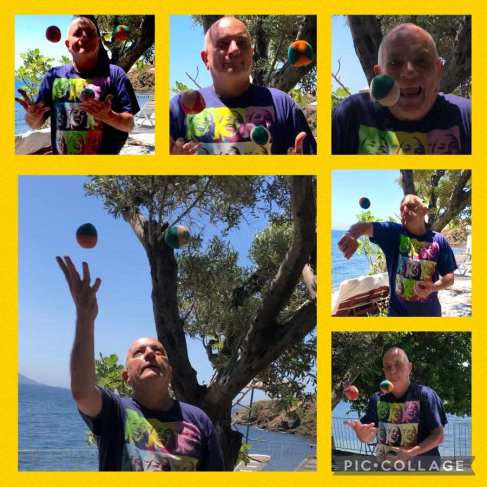During my current homeless peregrinations, I’m back in Istanbul after a little holiday (Madonna!) on the island of Marmara.

Fashion note: hard to tell, but I suspect my wearing of this T-shirt in honour of the wise AOC
rarely succeeds in spreading the message of compassionate social justice…
Poised somewhere between Doing Nothing and doing nothing (see Daoist non-action), to punctuate regular swims in the tranquil blue sea I revived my long-dormant juggling skills, framed by olive trees in an enchanted garden. Juggling is another instance of the blending of aşk mystical love and meşk devotion to practice; in company, one can enliven the diverse patterns to mime a story of charming abstraction.

And our wonderful hosts even found the little violin that their daughter had learned on, so that I could keep practising Bach suites. Despite having long been silent, it was perfectly in tune when I took it out of its case (cf. Muso speak: excuses and bravado)—but no-one would ever know that once I started to play…
Bach, juggling, and swimming make a perfect daily routine.
See also The beauty of frisbee.
* * *
Being busy doing nothing, I had limited curiosity to explore Marmara’s history and culture, but it was among many islands that were home to substantial Greek communities until the 1922–23 population exchange. The inhabitants had already suffered from piracy during the War of Independence from 1919, and when the Greeks were expelled, new waves of Turkish migrants took their place—from Crete, Thrace, and particularly the Black Sea region of Trabzon. With Marmara’s architecture and economy already devastated, a further trauma was the earthquake of 4th January 1935 (click here).

Anywhere in the world, the stories of elderly people are always fascinating (such as that of my orchestral colleague Hildi, a distressing autobiography from Tibet, and among many Chinese lives, e.g. A village elder). The way that Turkish folk from all walks of life gladly share their reminiscences with Augusta has a particular resonance (e.g. Fatma Hanım here). Their accounts not only remind us of the complexities of modern migrations, but hint at the ethnic tapestry of the former Ottoman empire—such as the recollections of Ünal Bey (85), benign baba of our island friends, who was sent alone to Istanbul from the Black Sea when young (like our Tophane wood-turner), becoming a tailor and eventually travelling as a Gastarbeiter to Bremen, where he soon established his business. By contrast with some interviewees in Love, Deutschmarks, and death, both he and his son Mehmet, who received a fine education in Germany, are full of praise for their hosts’ welcome. When Ünal Bey retired to Marmara in the 1980s, he created a beautiful home on a stretch of coast that then still lacked basic amenities.
